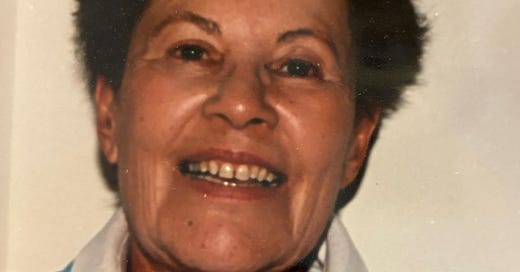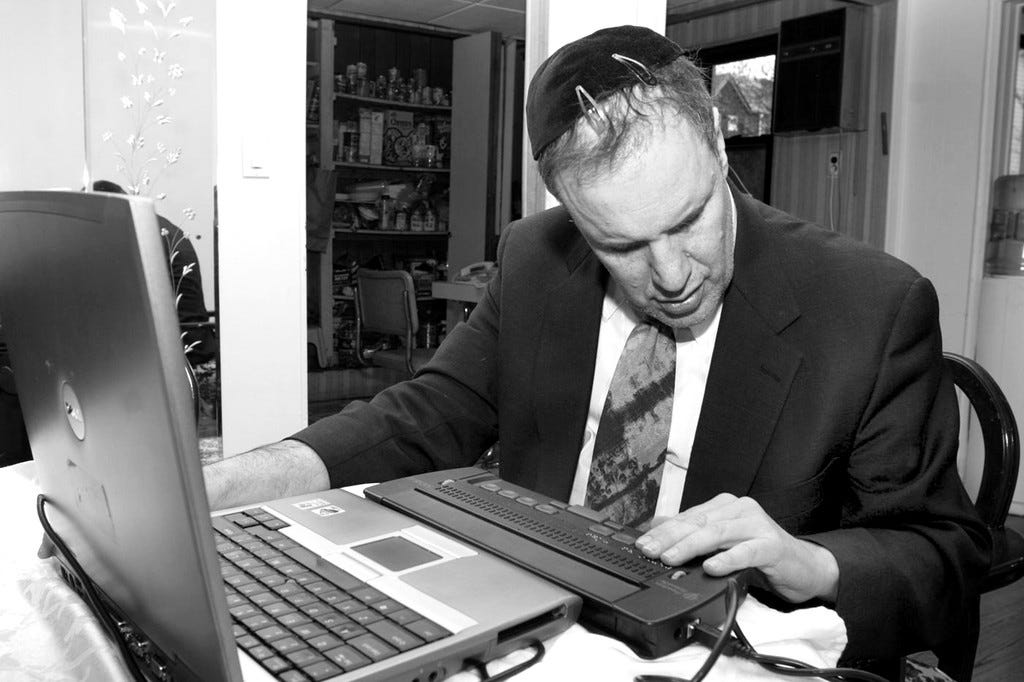Even when I was only 5, my mother encouraged me, her blind son, to explore the area near our house. She didn't allow me to cross the street, but there was still plenty to discover. The tree roots, searching for water underground, had cracked the sidewalk in many places. The slight downward slope followed by the large upward bump informed me that I was in front of our basement window. At the eastern edge of the property, I felt the pavement change to a different texture of concrete. Farther along, the recently repaved sidewalk by Anthony's house was miraculously smooth.
A few years later, my mother ran alongside me until I could ride my two-wheeler bicycle on the sidewalk, turn around at the corner, and pedal back to our driveway. Like other kids, I had my share of falls.
A “Solo” Trip to School
On a cool spring day in 1964, I began my first solo walk from home to school. For six months I had been trained to swing my white cane ahead of me. When my right foot stepped forward, the cane was already exploring where my left foot would land on the next step. By the time my left foot went forward, the cane was one step ahead on the right.
At the first intersection, I listened for cars but heard nothing. I followed my cane off the curve and crossed Central Avenue.
Three blocks later, I turned off LaReine and headed towards Brinley Avenue. Had the chilly day turned warm, or was the warmth coming from inside? I reached the cobblestones at the corner of Brinley, and crossed the final intersection. Then I confidently followed the fence to the school playground entrance.
"Hello, Michael." I acted cool, like twelve-year-olds do “Hi, Jackie."
Then Jackie said “Hello, Mrs. Levy.” If Jackie greeted her like that, she must be very close. Enraged, I turned and barked “You didn't TRUST me.”
I didn’t understand--my mother was the real hero! She almost succeeded in hiding her anxiety from me. She must have imagined me getting lost, walking into traffic, wandering onto the railroad tracks....
I heard the retreating hum of her bicycle tires.
Forty-Two Years Later
On a pleasant summer Sunday, a home health aide was pushing my mother in her wheelchair, down the familiar two blocks from home to the Bradley Beach boardwalk. The smell of French fries, sun lotion and salt water swept me back to childhood days at the beach.
Parkinson's disease had robbed Mom of her mobility and was now attacking her mind. She didn't want to remain on the boardwalk for more than ten minutes.
I dreaded her fading away, immobile in her living room. But she wanted to go home.
The short trip back was nearly over. The aide pushed my mother off the sidewalk into the quiet street to avoid those same bumps which I had explored.
My mother said “I want to go on the sidewalk."
"It's bumpy. It's not good for you," the aide soothed Mom with her lilting Caribbean accent.
"Let her go on the sidewalk if that's what she wants!" It was easier for me to yell at the good-hearted aide than it was to acknowledge my sadness.
My mother traveled to her home on the sidewalk. It was the least I could do for her.
On January 20, 2008 my brother-in-law met me when I arrived by bus to Bradley Beach. He told me that Mom was having difficulty breathing.
"She stopped breathing two minutes ago," my sister lamented when I arrived home. "She's gone."
Maybe Mom didn't want me to hear her last ragged attempts to breathe. But was she really gone?
I didn't see her during that first solo walk to school, and I don't see her now, as I travel on the train and subway. Yet I imagine her still, accompanying me as I cross every intersection.
She maintains her silence. I guess she doesn't want to interfere.
A native of Bradley Beach, New Jersey, Rabbi Michael Levy attributes his achievements to G-d's beneficence and to his courageous parents. They supported him as he learned to travel independently, visited Israel, and became more Jewishly observant. For 65 years, JBI International supported him with braille and recorded Judaica material.
He received rabbinic ordination from the Jewish Theological Seminary in 1981 and an MSW from Columbia University in 1982.
As a board member and now President of Yad Hachazakah, Rabbi Levy strives to make the Jewish experience and Jewish texts accessible to Jews with disabilities. In lectures at synagogues, camps, and educational institutions, he cites Nachshon, who according to tradition boldly took the plunge into the Red Sea even before it miraculously parted. Rabbi Levy elaborates, "We who have disabilities should be Nachshons--boldly taking the plunge into the Jewish experience, supported by laws and lore that mandate our integration.”
He applauds Jewish Disability Inclusion News’s ambition to give voice not just to those who work with the disabled, but also to people with disabilities themselves. “About us? Not without us” he is fond of reminding those eager to listen, and the media to whom the maxim may be out of their comfort zone.
For over 20 years, Rabbi Levy served as director of Travel Training at MTA New York CityTransit. Now retired, he is an active participant in Congregations Aish Kodesh and Young Israel in Woodmere, New York. Most of all, he relishes the company of his children, grandchildren, and large extended family.




